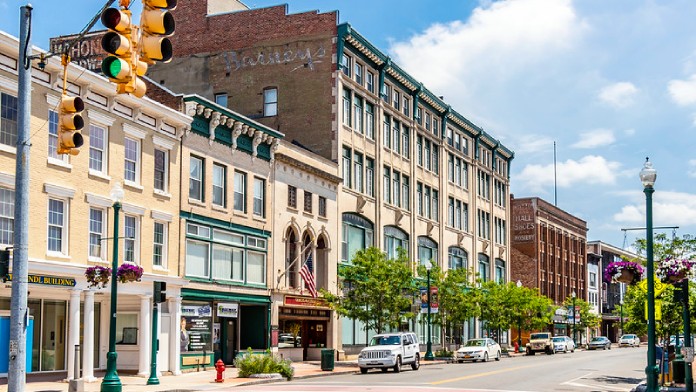Substance Abuse Statistics in Schenectady, NY
Recent substance-misuse data compiled by the CDC and the New York State Department of Health shows that:3,4,5,6
In 2020, 16.4% of Schenectady residents aged 18 and older reported that they binge drank.
From 2015 to 2020, the number of alcohol-induced deaths in Schenectady County rose by 25%.
From 2015 to 2020, Schenectady County saw a 116% increase in drug-induced deaths.
Levels of Substance Abuse Treatment
Multiple levels of addiction treatment are available. Some New York residents begin treatment with detox and work through the entire continuum of care. Others require only the least intensive levels of treatment.
Detox
Detox takes place in a supervised setting, such as a hospital or inpatient rehab facility. This is the process of safely clearing your system of all drugs and alcohol.
Residential or Inpatient
The most intensive treatment setting, residential or inpatient treatment, involves 24/7 supervised care. At this level of care, you typically participate in individual, group, and family therapy sessions, and you may receive medication and additional recreational therapies.
Partial hospitalization programs (PHPs)
PHPs are less intensive than inpatient, because you only stay at the facility during treatment times, then return home. Treatment often involves some of the same methods used in residential care.
Intensive Outpatient Programs (IOPs):
A step down from PHPs, IOPs provide several hours of treatment over several days per week. Methods often include individual and group therapy. Many New York residents transition to IOPs after completing a residential or PHP program.
Standard Outpatient
Standard outpatient programs involve a couple of hours of care per week, typically with a therapist at an outpatient clinic or at their office. This level of care is appropriate for individuals who have mild addictions and strong support systems.
Aftercare
Once outpatient or inpatient treatment is completed, aftercare begins. This ongoing support includes methods such as 12-step meetings, transitional housing, or therapy. It is an important component of relapse prevention.
How to Pay for Drug Rehab in Schenectady, New York
Private Insurance
Per the Mental Health Parity and Addiction Equity Act, all insurance providers must cover substance abuse treatment to some extent. Each plan differs, so New York residents should contact their providers to confirm exactly what is covered under their plan.
New York Medicaid
New York Medicaid is a government program for low-income residents whose resources/income are below specific levels. Eligible New York residents include pregnant women, children, and individuals certified blind or disabled. To use this program, residents must apply for Medicaid coverage in New York, and the treatment facility must accept Medicaid as a method of payment.
Medicare
Medicare is a government health insurance program that provides coverage for New York residents aged 65 and older, and individuals with certain disabilities. Some forms of addiction treatment are covered under Medicare Parts A and B. However, not all rehab facilities accept Medicare as a payment method, so it’s important to research the program before enrollment.
Sliding Scale Rehabs
Sliding scale rehabs allow New York residents to pay only what they can afford based on their income. To qualify, residents must provide proof of income when applying for treatment in New York.
TRICARE in New York
TRICARE in New York (East region) provides health insurance coverage for U.S. military personnel, veterans, and their dependents. Coverage includes addiction treatment services; however, various plans differ in what they cover.
IHS-Funded Drug Rehabs
At Indian Health Service (IHS) rehabs, Native Americans and Native Alaskans who need SUD treatment can receive low-cost or free services, even if other insurance coverage is available.
Traveling to and Within Schenectady, NY
 Are you contemplating traveling to Schenectady for rehab? Or perhaps you’ll be heading to the city to visit a loved one in an inpatient recovery program? Check out these tips that can help you plan your trip:
Are you contemplating traveling to Schenectady for rehab? Or perhaps you’ll be heading to the city to visit a loved one in an inpatient recovery program? Check out these tips that can help you plan your trip:
- Albany International Airport is your best option for flights into Schenectady. It’s located about nine miles southeast of the city (20 minutes away by car).
- Schenectady has a train station that offers service to Amtrak, which runs daily service from Montreal, Buffalo, and New York City.
- Schenectady has about a dozen 2- and 3-star national-chain and non-branded hotels and motels, all of which offer rooms at affordable prices.
- If you’d like to use public transportation, Capital District Transportation Authority (CDTA) offers affordable transit in New York’s Capital Region. You can choose from multiple routes that run to and from Downtown Schenectady and one that runs to Albany.
- Schenectady is served by the Capital District Transportation Authority’s bike-share program, which is available to both residents and visitors. You can rent a bike from your smartphone when you download their app.
- Attractions worth visiting include the Schenectady Light Opera Company, Proctor’s Theater, the Museum of Innovation & Science, VIA Aquarium, Van Gogh Albany: The Immersive Experience, and the Empire State Aerosciences Museum.
- The Mohawk River and the nearby Maple Ski Ridge and Plotter Kill Preserve offer numerous opportunities for outdoor fun, depending on the season.
New York Drug and Alcohol Laws
New York laws include the following policies regarding substance use and overdoses:1,2,3,4
911 Good Samaritan Law: This law protects New York residents who seek or receive emergency medical assistance for a suspected overdose. It does not cover drug felonies or those who have open warrants out for their arrest. It is meant to save lives by removing fear of legal repercussions for:
- Possession or use of a controlled dangerous substance
- Possession or use of drug paraphernalia
- Providing alcohol to minors
Overdose Prevention Bills: The governor of New York has signed five bills into action, S.911/A.2354, S.1795/A.533, S.2523/A.868, S.6044/A.128, and S.7228/A.5511, to reduce the number of overdoses across the state and encourage New York residents to seek help for substance use disorders. Each bill seeks to decriminalize individuals with substance use disorders and provide care for all. For example, one bill is designed to encourage judges to order individual treatment instead of incarceration for nonviolent crimes.
Employee Protections for Addiction Treatment: The state of New York considers substance use disorders a disability. This status protects employees with SUDs under the Americans with Disabilities Act. They can’t be discriminated against or fired for their SUD, although the law does not protect those who use substances during work, which may be grounds for disciplinary action.
Drug and Alcohol-Free Workplace: In New York, on-the-job use of, or impairment from, alcohol and controlled substances is prohibited. If employers have reasonable suspicion of job duty impairment due to the use of alcohol or controlled substances, they may require the employee to undergo medical testing. If the employee is found to have an SUD disability, they may refer the employee to the state Employee Assistance program, pursue disability leave procedures, or enact disciplinary measures if applicable.
Resources
- New York Senate. (2022, July 08). Schumer Announces, After Direct Visit & Advocacy Last Month Following Deadly Wave of Overdoses, Schenectady County Has Received Critical Federal “High Intensity Drug Trafficking Area Designation”.
- Substance Abuse and Mental Health Services Administration. (n.d.). FindTreatment.gov.
- Centers for Disease Control and Prevention, National Center for Health Statistics. CDC Wonder Online Database. (2021). Underlying Cause of Death, 1999-2020 Results, Deaths occurring through 2020.
- Centers for Disease Control and Prevention. (2022). PLACES: Local Data for Better Health, Place Data 2022 Release.
- New York State Department of Health. (2022, October). New York State — County Opioid Quarterly Report.
- New York State Department of Health. (2022, January). New York State Opioid Data Dashboard — County Level.



